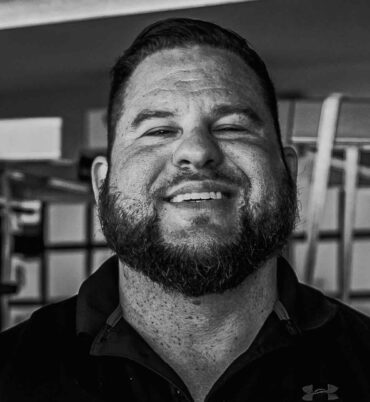Brian Carroll: Getting strong caused mental setbacks
Unfiltered met retired powerlifting legend Brian Carroll who in 2020 recorded the heaviest squat of all time – 1306lb (592kg) at a bodyweight of 303lb – after working with renowned back specialist Professor Stuart McGill to overcome years of injury problems. The journey led to them writing the best-selling book “Gift of Injury”, which documents Carroll’s return to competitive lifting under McGill’s care.
This transcript has been taken from our video interview with Brian Carroll and has been edited for clarity and brevity. You can watch the full video interview here.
Brian, you have the all-time biggest squat. But getting to there has been quite a journey, hasn’t it?
Yeah! It’s been three years since that big squat and I’m working on a documentary that kind of parallels “Gift of Injury” but gives you a visual with the videos and me talking about my mindset, [starting with] the complete rebuild [of my back]. There’s some early videos of me squatting just the bar and working back up over time [before] eventually getting back to that 1306lb squat.
Once you broke the world record you retired. Why?
The one thing that made me step away three years ago was not my physical ability. It was my mental ability to go to 100% neural drive, 100% turned on that particular day that I have to train and just being so myopic. It was time to move on to the next thing.
And I was pretty much just getting burnt out. You know, even though my rehab process is documented in “Gift of Injury” [and] went pretty good considering all the things I was dealing with, but I didn’t realise actually – I never really talked about this – how much of a toll it took on me mentally.
I think caught up with me years down the road that I didn’t realise because my back being so f’ed up, I just compartmentalised all that, right? And didn’t even think about that or process that and just went right into finding the cure. That’s when I hooked up with Dr McGill, then I had the cure. So it’s all about cure, rebuild, build, stay on track. Don’t let anyone bait you into doing too much or don’t worry about what people are saying online. Stay focused. And I was lucky enough to have 21 years of doing that.
What impact did the drugs have on your body and mind?
After a while the drugs, taking the drugs, which are necessary to lift that type of weight in my opinion, in my experience at least, they really mess with your head and it makes general life difficult.
Work, getting up on time, obligations around the holidays and all that stuff. After a while, I just couldn’t tolerate the drugs, even though I didn’t run crazy doses of drugs compared to some people.
Nonetheless, after a while I just couldn’t tolerate it anymore and it was time to step back.
I hit that big squat, I went out on top, and I knew that I wasn’t likely to replicate anything like that [again]. So it was just like, I have baby girls now, it’s time to go on to the next thing, let’s focus on helping as many people as possible going forward.
How did you feel before attempting a huge lift?
When I’m walking up [to the bar] I’m usually pretty scared. It’s probably similar to what a UFC fighter is facing walking into the octagon. I’ve never seen anyone in the UFC turn around and not fight. They at least made it to the octagon, even if they tapped out early or wanted to check out early, right? Just went down.
It’s not like I’m gonna do that, but it’s definitely one of those feelings that if the roof caved in and they had to suddenly stop to meet, I wouldn’t be really upset about it! I would be, but I wouldn’t be. I’m kind of looking for an out in some ways, but that’s just the weak side of me talking.
And then I just keep pushing ahead [knowing that] I’m prepared. And then I think about how much I want to get to the lift. I play the movie forward and think, how mad am I going to be at myself two weeks from now if I miss this lift? Do it perfect, lock it in.
What else would you think about for motivation or focus?
I’d think about other failures that I’ve had in my personal life or my lifting life, and all that culminates into one nastiness, one rigidness, stiffness, of being determined – that no matter what – when I picked up that weight I would control it, stabilise it, and squat it. That was my thought, even though [before the 1306lb lift] I’d never handled more than 1205lb in my life.
Before the [world record] attempt, I peaked in such a way that I was ready to handle that kind of weight without having handled it before. By backing off for a couple weeks and resting, going into the meet, having super-delusional belief in myself. There was really no limit to what I could do. If I can pick this weight up, I know I can squat it.





